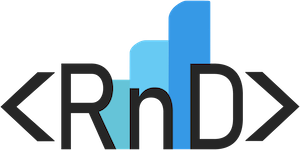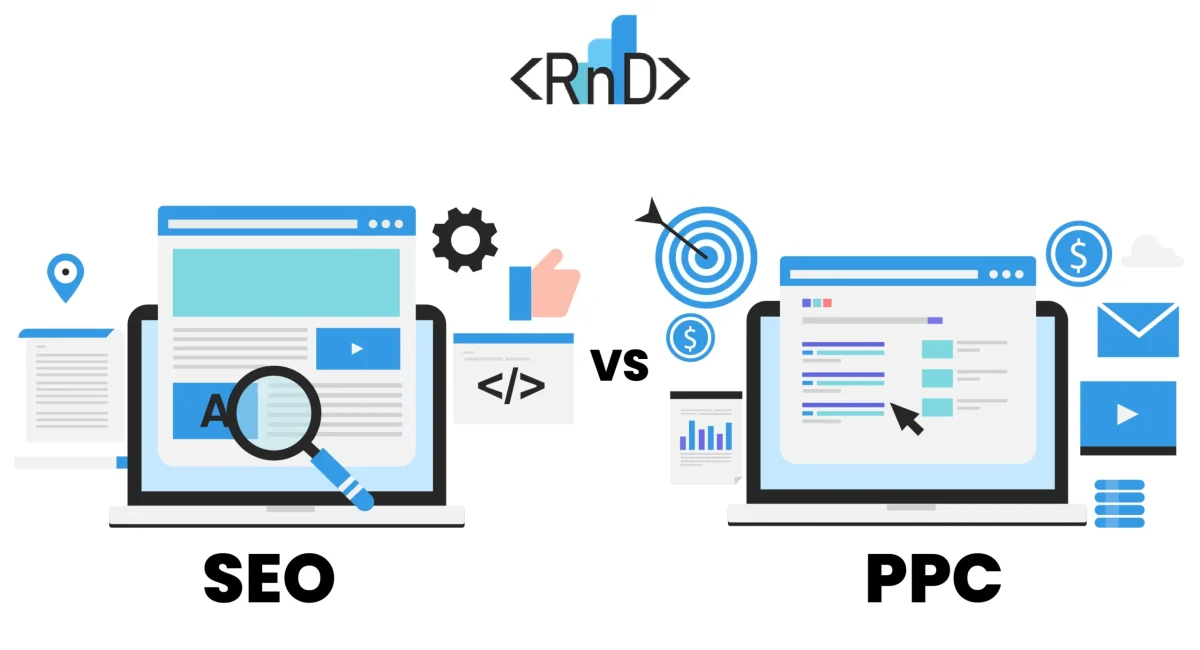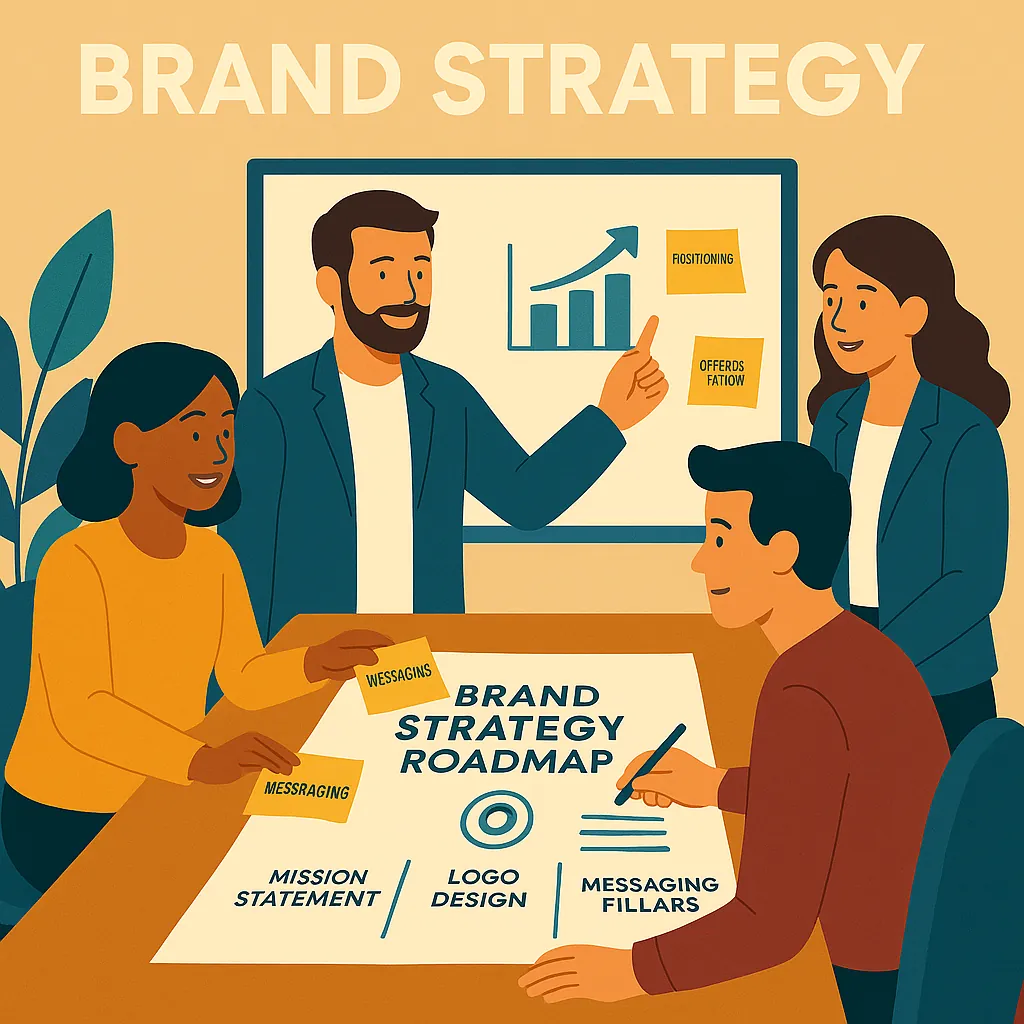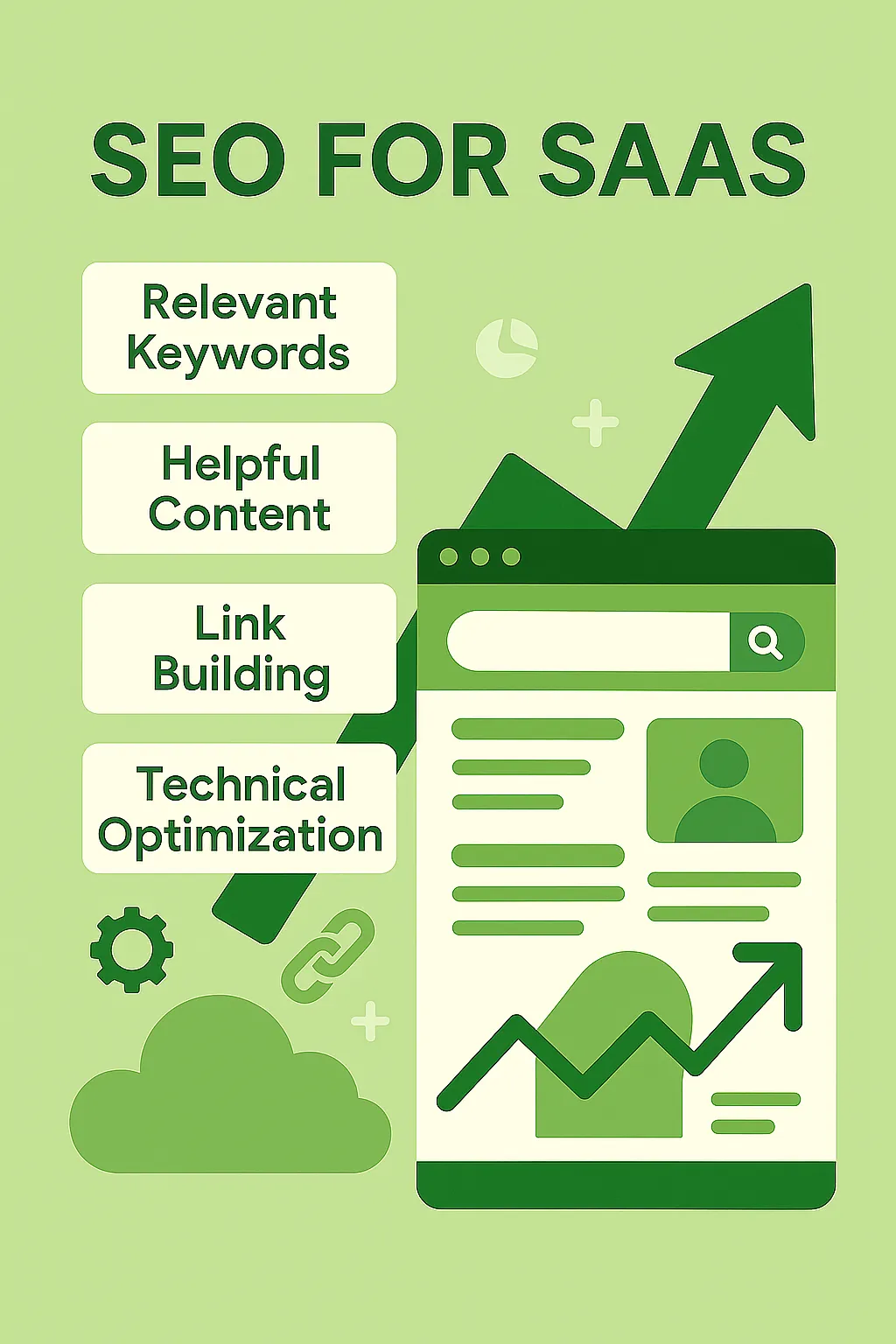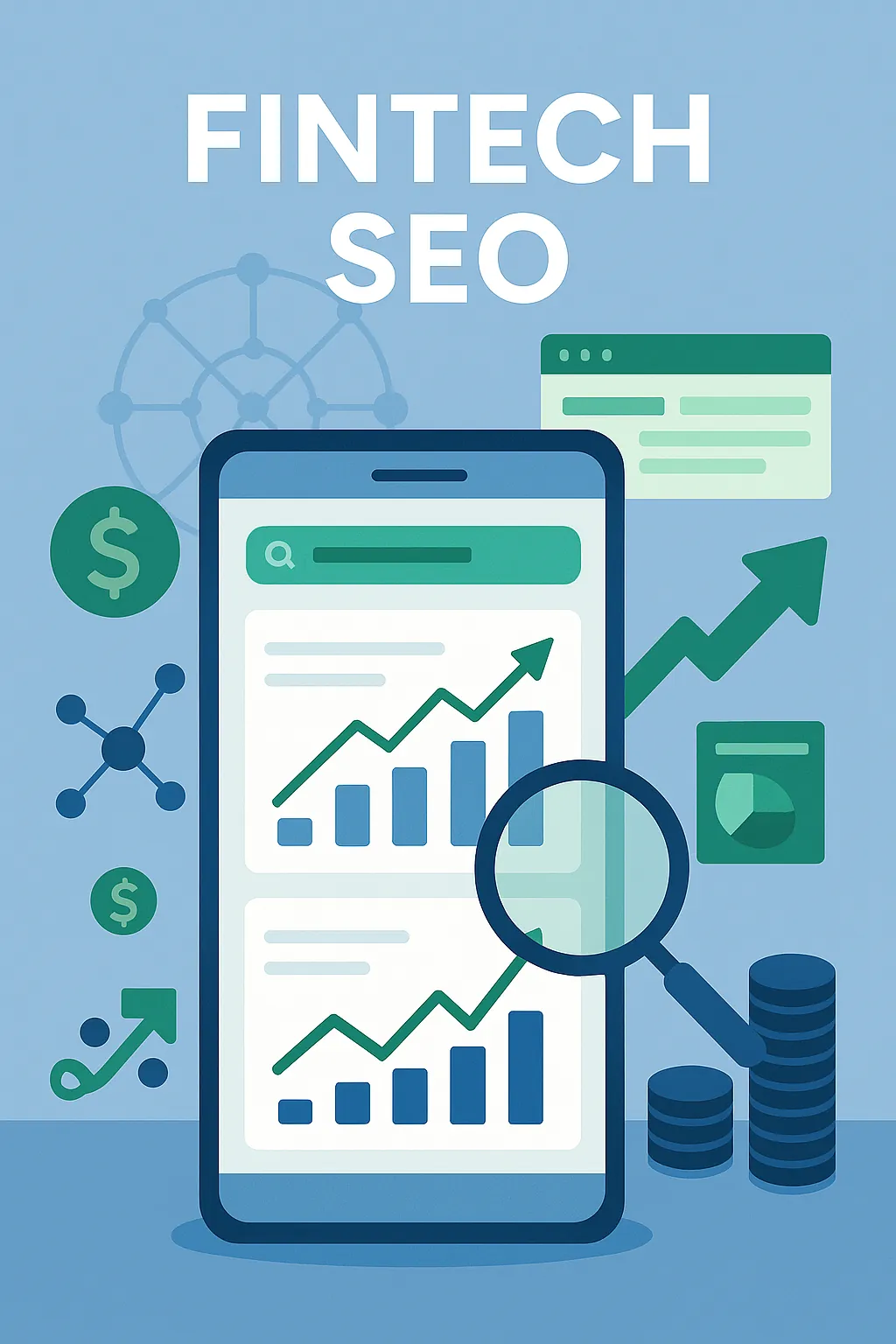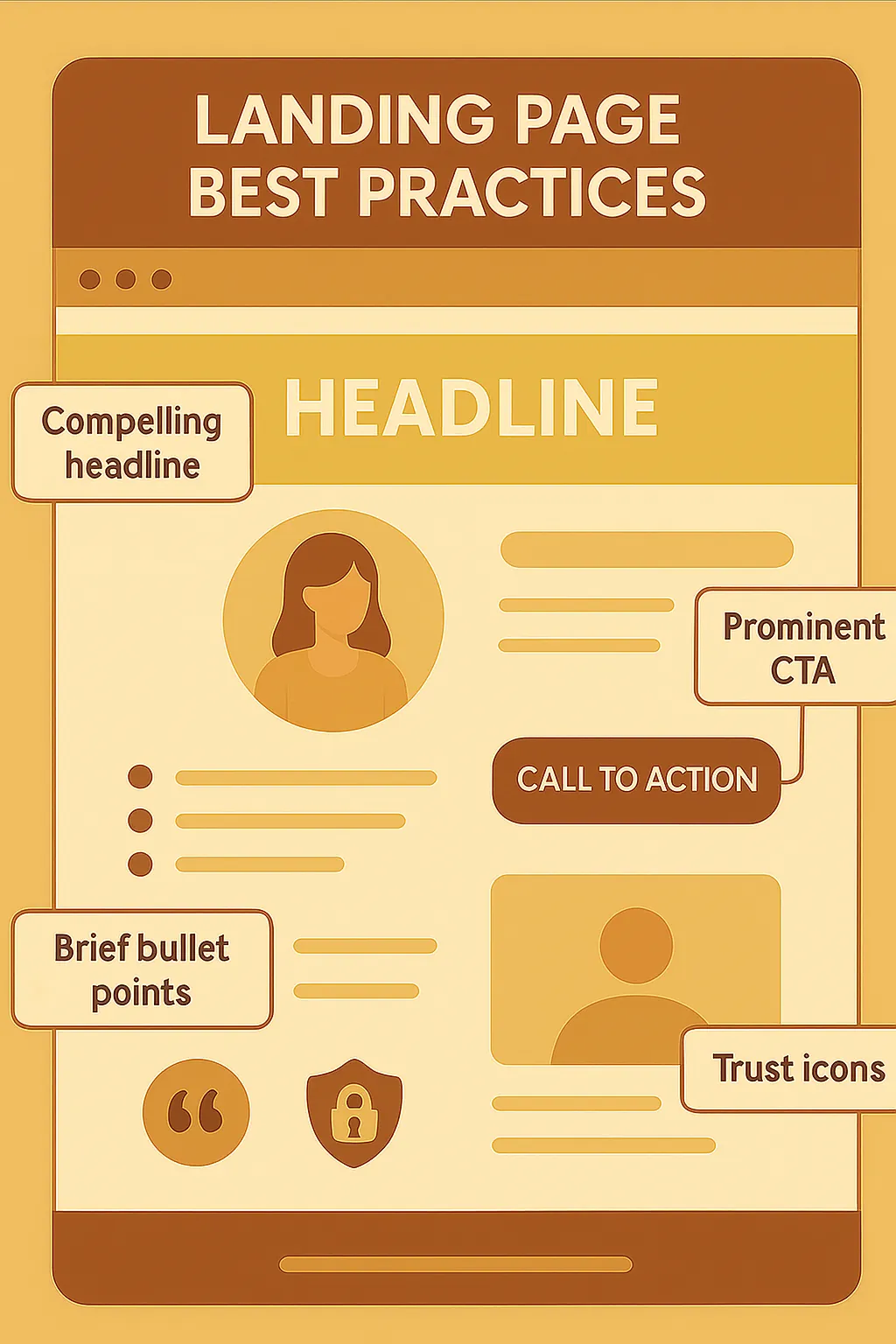Welcome to our friendly guide on SEO vs. PPC! We’re going to explore these two big players in digital marketing. We’ll keep things simple and help you decide which strategy, or a mix of both, is best for your business. If you are familiar with some of the topics we are covering here, feel free to skip to the comparison part. Let’s get started 😎!
What are we going to cover today?
What is Search Engine Optimization (SEO) 🤔?
Ever wondered what is SEO and how some websites end up at the top of your search results? That’s all thanks to SEO! Let’s take a closer look at Search Engine Optimization, or SEO, and why it plays such a big part in getting your business noticed online.
Definition of SEO
SEO is the process of enhancing a website’s visibility in organic (unpaid) search engine results. It involves optimizing various aspects of a website, including content, design, and technical elements, to improve its ranking on Search Engine Results Pages (SERPs). The ultimate goal of SEO is to increase website traffic, enhance the user experience, and drive conversions.
There are various tools to help you do SEO properly, but we won’t discuss those now.
How SEO Actually Works
SEO works through a systematic process involving several steps:
- Crawling: Search engines deploy bots, often called “spiders” or “crawlers,” to discover new or updated content across the internet. This could be any form of content – from new web pages to refreshed blog posts.
- Indexing: Once the content is found, it’s added to an “index.” An index is a giant database where all the discovered content is stored. It’s like a library where search engines can find and retrieve the content later.
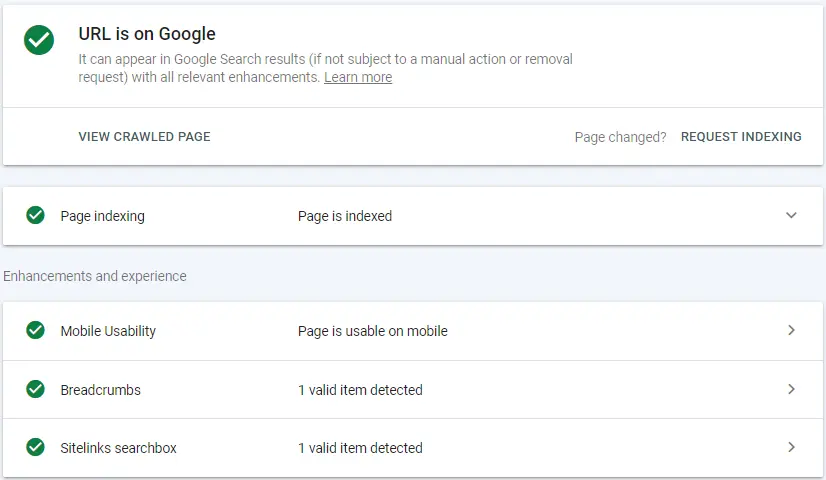
- Ranking: When a user types a query into a search engine, it looks into the index to find and display the most relevant pages in the search results. The process of deciding which pages are most relevant to a query is called “ranking.” Search engines use complex algorithms to rank these pages based on hundreds of factors like how relevant the content is to the query, the credibility of the website, and the overall user experience on the site.
Importance of SEO in Digital Marketing
In the world of digital marketing, SEO is a crucial tool. Why? It helps your website rank higher in search engine results, meaning more potential customers can find you. Without SEO, your website may get lost in the sea of countless others. Plus, SEO targets users who are actively looking for your products or services, making it more effective than many traditional marketing strategies. This is why SEO is a key component of any successful digital marketing plan.
Take a look at this interesting core web vitals case study, that yielded some great SEO results.
Advantages and Disadvantages of SEO
Just like any marketing strategy, SEO has its ups and downs. Let’s dive in and look at the good and not-so-good parts of using SEO in your digital marketing.
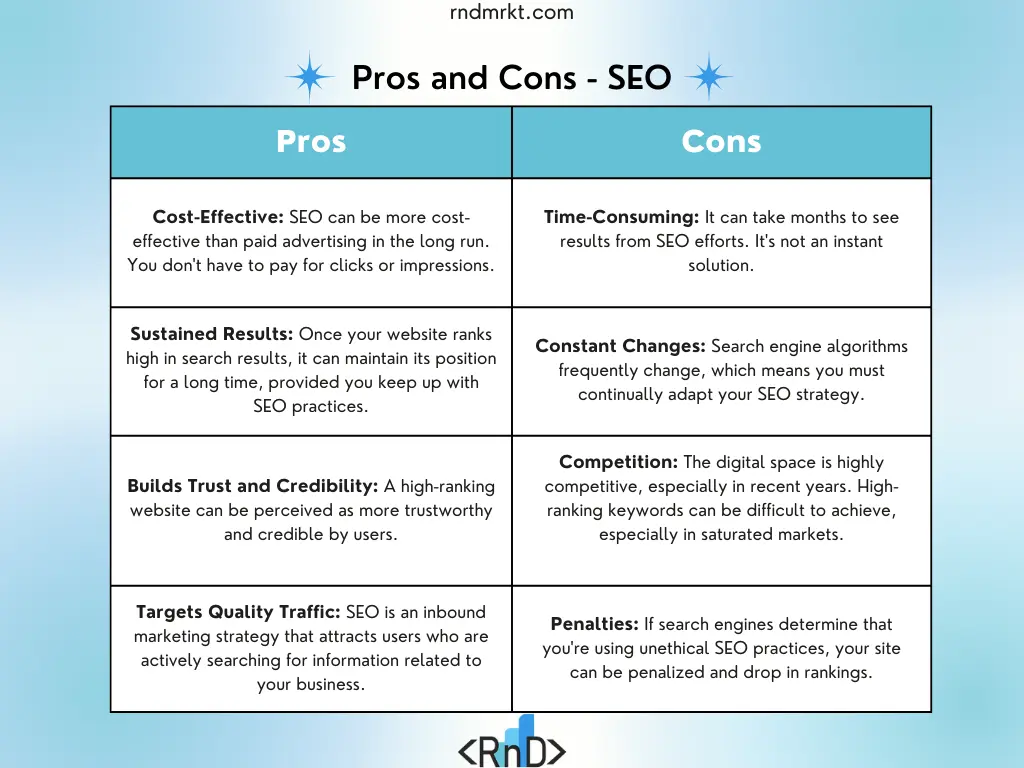
Advantages of SEO 👍
- Cost-Effective: SEO can be more cost-effective than paid advertising in the long run. You don’t have to pay for clicks or impressions.
- Sustained Results: Once your website ranks high in search results, it can maintain its position for a long time, provided you keep up with SEO practices.
- Builds Trust and Credibility: A high-ranking website can be perceived as more trustworthy and credible by users.
- Targets Quality Traffic: SEO is an inbound marketing strategy that attracts users who are actively searching for information related to your business or industry.
Disadvantages of SEO 👎
- Time-Consuming: It can take months to see results from SEO efforts. It’s not an instant solution.
- Constant Changes: Search engine algorithms frequently change, which means you must continually adapt your SEO strategy.
- Competition: The digital space is highly competitive, especially in recent years. High-ranking keywords can be difficult to achieve, especially in saturated markets. Check out the graph below that shows the increase in live websites over the years.
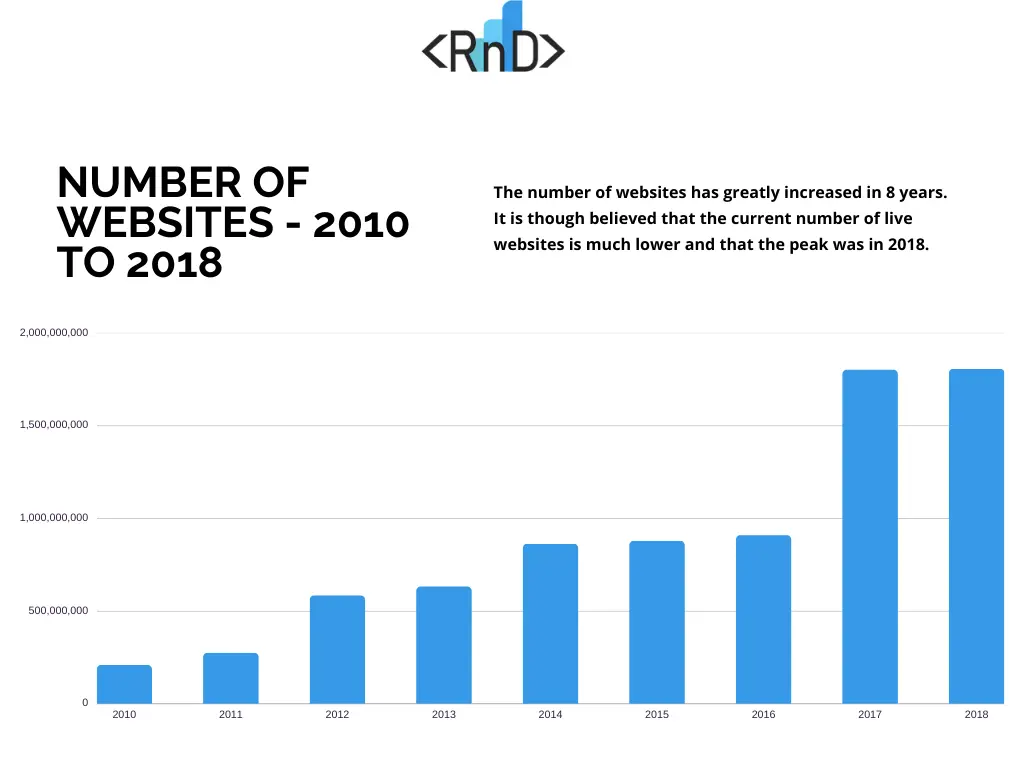
- Penalties: If search engines determine that you’re using unethical SEO practices (also known as “black hat” tactics), your site can be penalized and drop in rankings.
Now that we learned the basics of SEO and its importance, let’s dive into PPC!
What is Pay-Per-Click (PPC) 🤔?
Ever clicked on a sponsored ad while searching online? That’s PPC at work! Let’s unpack Pay-Per-Click, or PPC, and understand how it plays a vital role in boosting your business’s online visibility and revenues. Take a look at these 6-month results, obtained with a rather small client budget as part of our PPC professional services. Pretty cool, right?
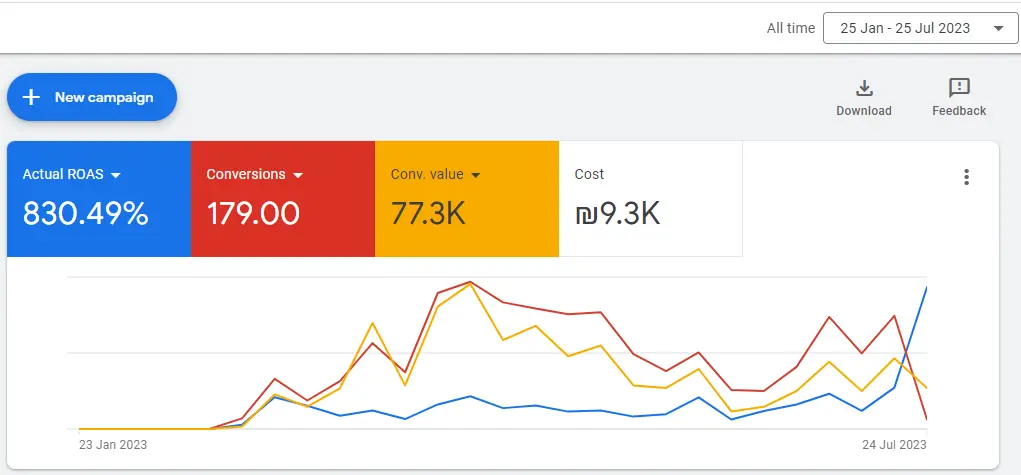
Definition of PPC
Pay-Per-Click, also known as PPC, is a type of online advertising where advertisers pay a fee each time their ad is clicked by a user. In essence, it’s a way of “buying” visits to your site, rather than earning them organically through SEO. PPC ads can appear in search engine results, on social media platforms, and on various websites participating in ad networks.
Understanding PPC: From Ad Auction to Placement
Let’s break down the PPC process into easy-to-understand steps:
- Ad Auction: This is an automated process that search engines use to determine which ads to display and their placement. When a user searches, the engine starts an auction, taking into account all relevant ads.
- Bidding: Advertisers place bids on keywords they believe their potential customers might use while searching for their products or services. This bid represents the maximum amount an advertiser is willing to pay for a click on their ad.
- Ad Placement: This is where your ad appears. It could be on search engine results, specific websites within an ad network, or different parts of social media platforms. Placement depends on factors like your bid, ad relevance, and the quality of your ad and landing page. Check out this example of an ad that is placed through Google’s display network.
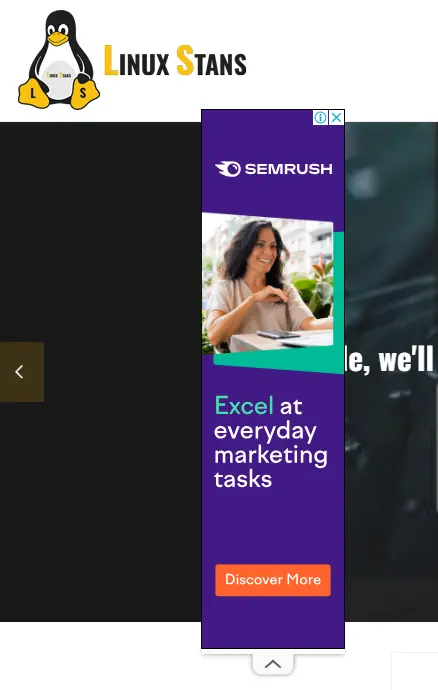
Importance of PPC in Digital Marketing
In digital marketing, PPC is like an instant teleport. It can take your business to the top of search results, and fast. PPC is crucial because it allows your business to reach potential customers quickly by placing your ads in noticeable positions, like the top of search engine results. Moreover, you can target your ads to specific audiences, times, and locations. Therefore, PPC is a powerful tool in digital marketing for businesses looking for speedy results.
This is one of the reasons why PPC is usually the first marketing go-to when launching a new business or service.
Advantages and Disadvantages of PPC
Especially if you are looking for a high-quality performance marketing agency, it’s essential to compare the benefits against the drawbacks of each marketing channel. Let’s evaluate the pros and cons of using PPC in your online marketing efforts.
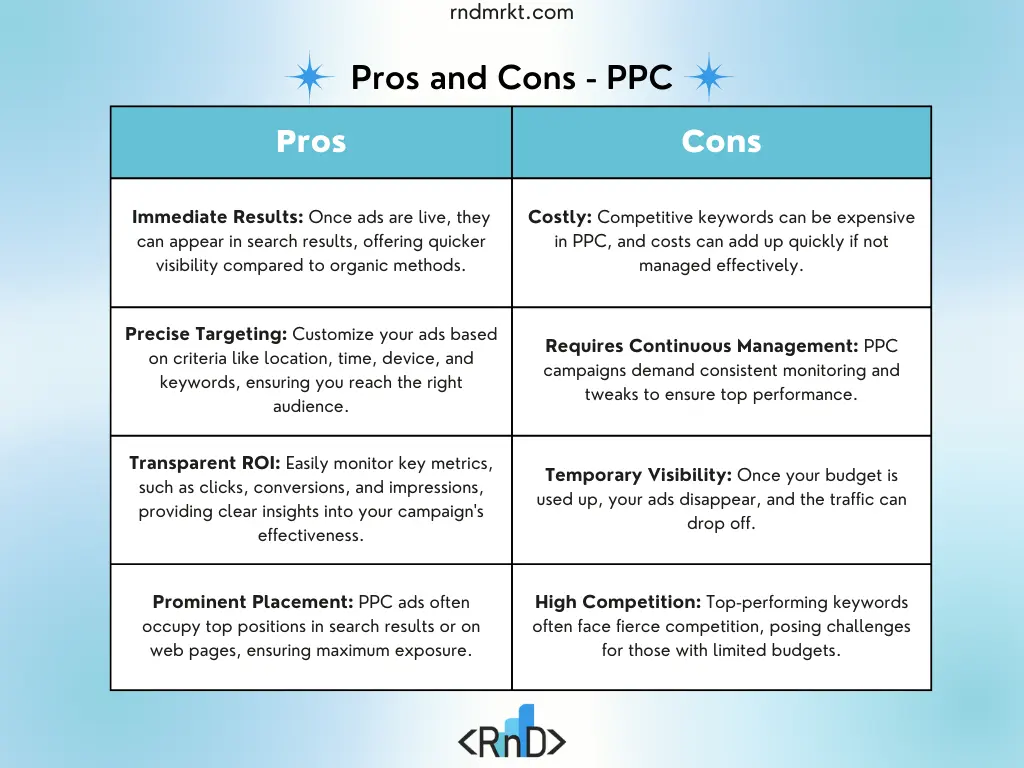
Advantages of PPC 👍
- Immediate Results: Once ads are live, they can appear in search results, offering quicker visibility compared to organic methods.
- Precise Targeting: Customize your ads based on criteria like location, time, device, and keywords, ensuring you reach the right audience.
- Transparent ROI: Easily monitor key metrics, such as clicks, conversions, and impressions, providing clear insights into your campaign’s effectiveness.
- Prominent Placement: PPC ads often occupy top positions in search results or on web pages, ensuring maximum exposure.
Disadvantages of PPC 👎
- Costly: Competitive keywords can be expensive in PPC, and costs can add up quickly if not managed effectively.
- Requires Continuous Management: PPC campaigns demand consistent monitoring and tweaks to ensure top performance.
- Temporary Visibility: Once your budget is used up, your ads disappear, and the traffic can drop off.
- High Competition: Top-performing keywords often face fierce competition, posing challenges for those with limited budgets.
PPC, like all digital marketing channels, offers unique advantages but comes with its set of challenges. It’s important to evaluate these factors in line with your business objectives and marketing budget.
SEO vs. PPC: A Detailed Comparison
Now the real fun begins! As we delve deeper into the intricacies of SEO and PPC, we’ll explore not just the costs, but also the nature of traffic, how fast you can expect results, the potential for scaling up, and the ever-important user trust factor.
Get ready as we dive into these crucial digital marketing elements 😲!
1. Comparing Costs: SEO vs. PPC
Determining the right marketing channel often begins by evaluating expenses. Both SEO and PPC have unique cost structures. To give you a clearer picture, we’ve provided a comprehensive table outlining the critical costs involved in both channels.
| Cost Factors | SEO | PPC |
|---|---|---|
| Initial Analysis | Subscription fees for tools like Moz, SEMrush; time spent on industry and competitor research | Keyword tool subscriptions such as Google Keyword Planner; time spent on competitive analysis |
| Optimization/Ad Creation | Direct costs per click, and potential platform fees depending on the advertising platform chosen | Expenses for crafting compelling ad copy and designing ads |
| Content/Ad Design | Costs for producing regular website content—whether in-house or freelance, including multimedia content | Charges for creative professionals crafting ad visuals and compelling copy |
| Link-building/Ad Spend | Investments in guest posting, PR campaigns, and other link-acquiring strategies | Direct costs per click, potential platform fees depending on the advertising platform chosen |
| Maintenance/Management | Fees for monitoring tools, updating content in response to algorithm changes, and other continuous SEO efforts | Ongoing expenses for campaign optimization, A/B testing, adjusting bids, and managing campaign health |
In summary, SEO is a long-term strategy with costs spread over time, while PPC can provide immediate visibility but usually comes with a direct, sometimes high, cost. Choosing between the two involves weighing your budget, your revenue targets, and your desired timeframe for seeing results. It is worth noting that SEO could reduce the costs of PPC by making your brand more credible overall, improving the CTR and conversion rate of your paid campaigns.
Our verdict: Invest 30% of your marketing budget in SEO, and the remaining 70% in PPC (may vary of course, depending on the industry and goals).
2. Quality of Traffic: SEO vs. PPC
The quality of traffic to your website is an important metric. It’s not just about numbers but about how relevant and engaged your visitors are. Both SEO and PPC bring in traffic, but there are differences in the nature and behavior of users coming through these channels.
| Metrics | SEO | PPC |
|---|---|---|
| Nature of Traffic | Organic, intent-driven | Paid, highly targeted based on set criteria |
| Engagement | Typically higher page views and longer sessions | Depends on ad relevancy and landing page quality |
| Cost Implications | Costs spread over time; no cost per click once ranking | Direct costs per click, can be expensive if not managed |
SEO Traffic
SEO-driven traffic is organic, meaning these users find your website naturally through search engine results. Here are some characteristics:
- Intent-Based: Users often have a specific search intent in mind, which leads them to click on your site. Whether they’re seeking information, making a purchase, or comparing products, organic clicks are typically intent-driven 🎯.
- Sustained Engagement: Due to its nature, organic traffic often brings users who spend more time on your site, view more pages, and have lower bounce rates.
- Cost-Efficiency Over Time: While SEO involves upfront costs, once you’re ranking well, you’re not paying for each click, potentially making it more cost-effective in the long run.
PPC Traffic
PPC-driven traffic results from users clicking on your paid ads. Here are some notable points:
- Highly Targeted: With PPC, you can define the exact audience you want to reach based on various criteria like demographics, location, interests, and behaviors. This often brings in a very targeted set of users who are more likely to convert.
- Immediate Results: Unlike the gradual buildup of organic traffic, PPC can yield immediate clicks as soon as your ad is live.
- Potential for Higher Costs: While PPC can bring in targeted traffic, it comes at a direct cost for every click. Without proper management, PPC costs can get out of hand.
In summary, while SEO tends to bring in users with genuine intent, leading to more extended engagement, PPC’s strength lies in its precise targeting, giving immediate and highly relevant traffic. The choice between them often leans on your goals, budget, and the specific audience you aim to attract.
Our verdict: SEO traffic usually brings higher-quality leads.
Interesting read: Learn how to optimize your Facebook ads!
3. Speed of Results: SEO vs. PPC
When businesses invest in marketing, they often have a timeline in mind for seeing returns. The speed at which SEO and PPC deliver results can vary quite significantly. Let’s explore the timelines associated with each and what you can expect.
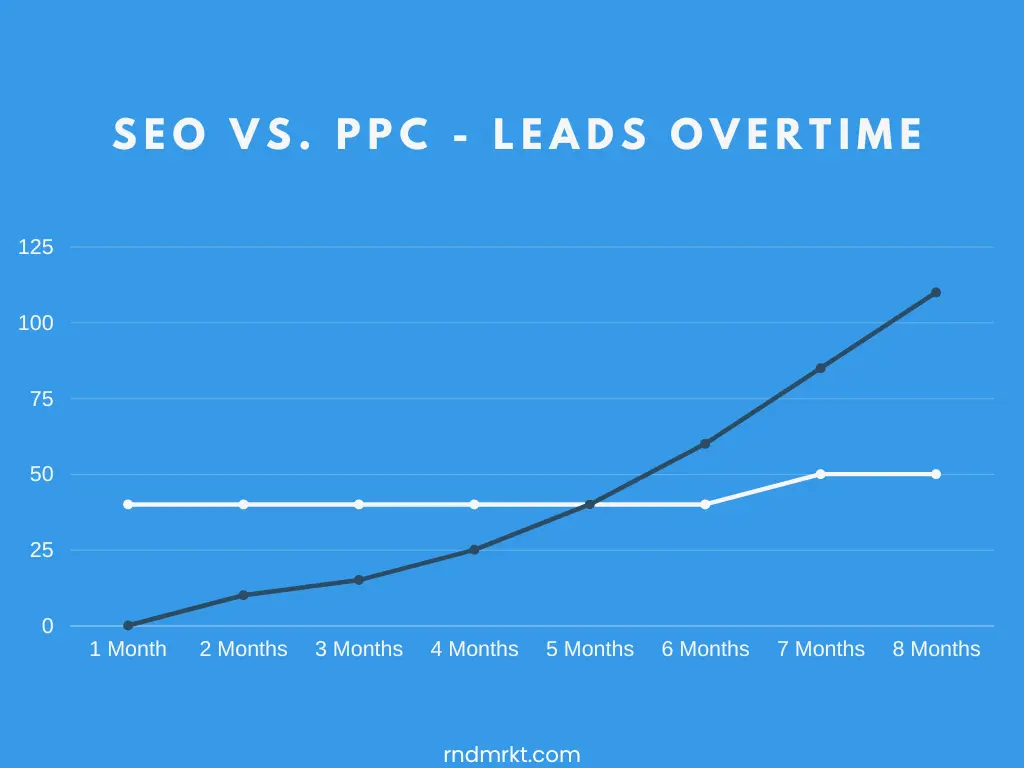
SEO: The Marathoner 🏃
- Time-Intensive Setup: SEO demands a well-thought-out strategy. From keyword research, on-page optimization, and content creation, to link-building, the initial phase can be time-consuming.
- Gradual Buildup: Once the foundational SEO work is complete, it takes time for search engines to index, rank, and drive organic traffic to your site. Typically, businesses might start seeing initial results in 3-6 months, but it can vary.
- Compounded Growth: The beauty of SEO is that, over time, your efforts compound. As your site establishes authority and ranks for more keywords, the traffic continues to grow. Take a look at this example from a client that uses our SEO marketing services for around 6 months:
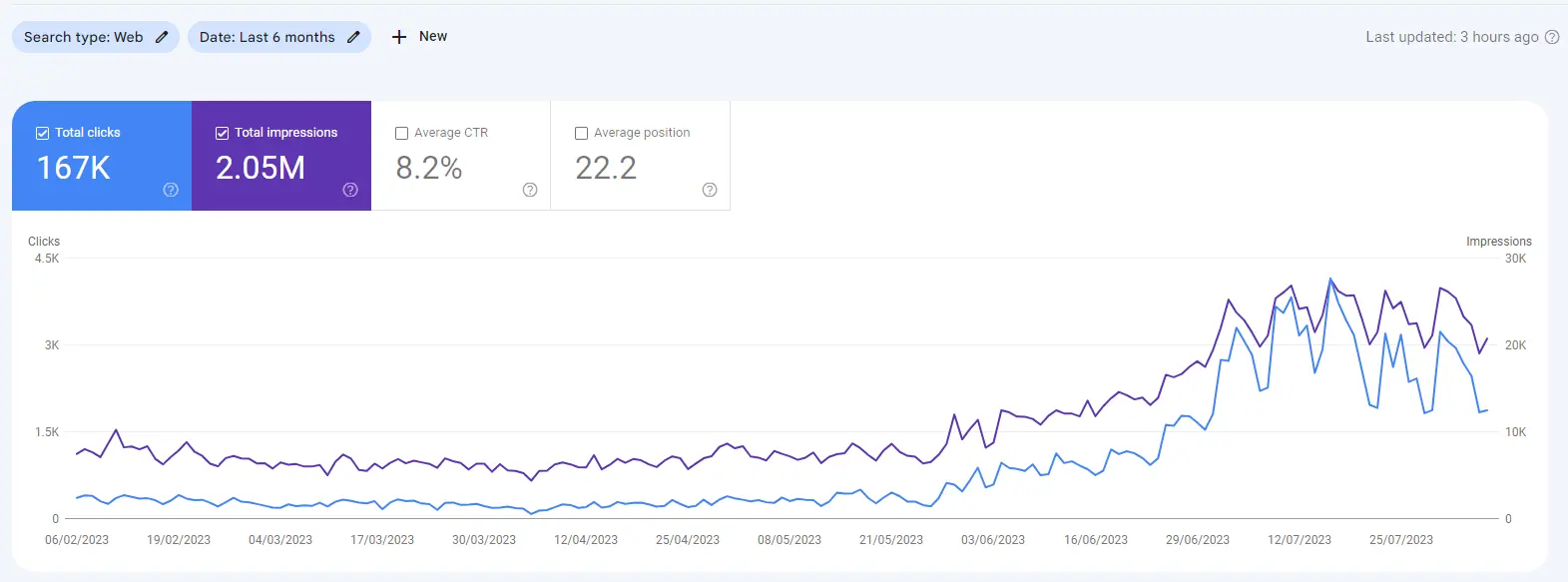
PPC: The Sprinter ⏱️
- Quick Setup: Once you’ve decided on your target keywords, ad copy, and campaign settings, you can launch a PPC campaign. Setting up might take days or even minutes, depending on your familiarity with the platform.
- Immediate Traffic: As soon as your PPC ads are live and your bids are competitive, you’ll start receiving traffic. There’s no waiting period like with SEO 😴.
- Consistent Monitoring: For continued success, PPC campaigns require ongoing optimization. Tweaking ad copy, adjusting bids, or refining target audiences can influence results daily.
In conclusion, if you’re looking for quick results and are prepared for consistent monitoring, PPC is your go-to. On the other hand, if you have a longer horizon and are looking for sustained, organic growth, that will eventually bring in more leads than PPC, SEO is a worthy investment. Often, a combination of both (which we’ll discuss soon 😉), especially in the early stages, can provide a business with both immediate visibility and long-term stability.
Our verdict: PPC provides immediate results, while SEO will most likely surpass PPC in the long term.
4. User Trust and Perception: SEO vs. PPC
Understanding user trust and perception can make a significant difference in the efficacy of your digital marketing efforts. While both SEO and PPC play important roles in online visibility, they are perceived differently by users. Drawing insights from research and case studies helps shed light on these nuances.
SEO: The Trust Builder
Through organic results, businesses can build long-standing trust and a reliable reputation. Here’s how SEO cements its place as the ultimate trust builder in the digital world.
- Organic Equals Trustworthiness: According to a BrightLocal study, 87% of consumers read online reviews for local businesses. Given that organic search results often lead users to review sites or authoritative content, they tend to trust these more.
- Established Presence: A Search Engine Land article mentions that consistent visibility on the first page for targeted search terms can establish a brand as a thought leader in the eyes of users.
- Non-Intrusive Approach: Users often prefer content that informs or entertains without overtly selling. With SEO, the emphasis is on providing value, which aligns with user preferences.
PPC: The Attention Grabber
PPC campaigns make a splash by capturing immediate attention. With top spots on search pages and precise targeting, PPC gets straight to the point.
- Top-of-Page Visibility: Google’s sponsored ads usually occupy the top slots, ensuring immediate visibility. According to Lunio, Google Ads’ top three paid advertising spots result in 33% of the clicks on the search engine results page.
- Perceived Skepticism: Most of the users can’t distinguish between organic search results and paid ads, but among those who can, there’s a slight skepticism towards sponsored listings.
- Relevance is Key: PPC allows for highly targeted advertising, meaning ads are tailored to user queries. If users find the ad highly relevant, they’re still likely to click on it regardless of its paid nature.
In conclusion, while SEO primarily helps in building long-term trust and brand authority, PPC can capture immediate attention and prompt action, especially when aligned with user intent. It’s essential to strike a balance, ensuring your brand remains trustworthy in organic listings while leveraging the immediate benefits of paid advertisements.
Our verdict: Build your long-term reputation with SEO, while monetizing your products with a high-quality landing page by using PPC campaigns.
5. Which Channel Generates More Sales: SEO vs. PPC
This is a difficult question to answer. To give you a better idea of which channels work the best in terms of lead generation, we asked 20 business owners what channel brings them the highest number of leads. Of course, some of those businesses invested only in one marketing channel, so the results may be questionable.
Take a look at the chart below. 13 out of the 20 businesses that participated in the survey, has more leads coming in from organic traffic.
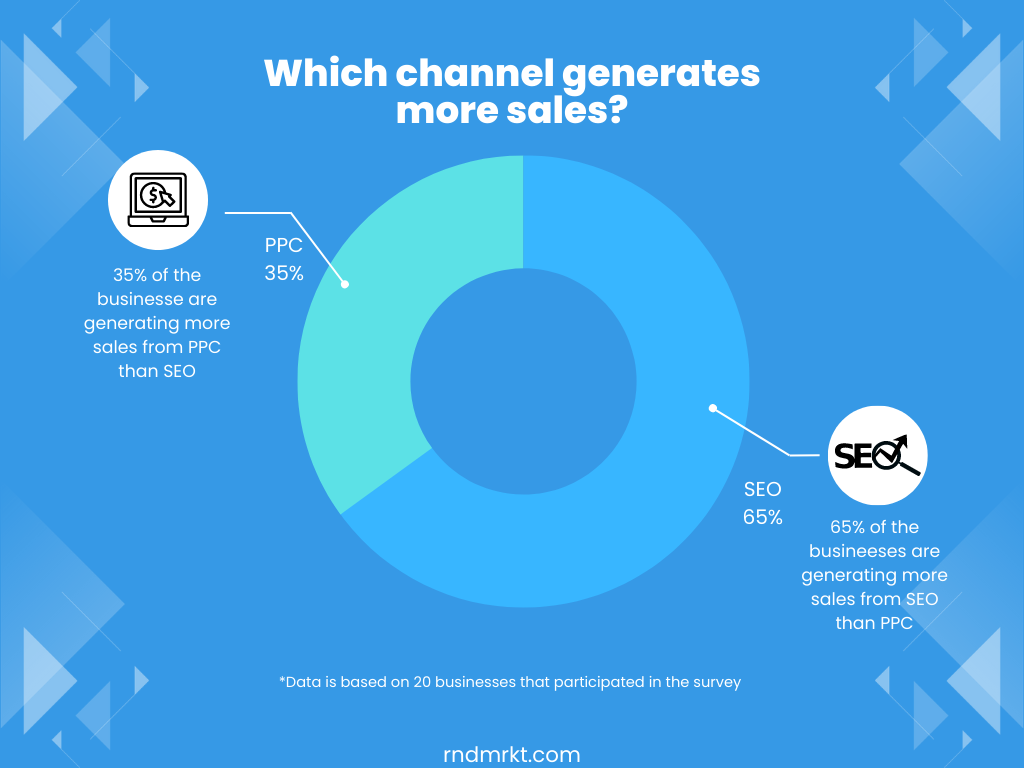
The Synergy of SEO and PPC 🧑🤝🧑
SEO provides a solid, long-term online presence, while PPC offers immediate visibility. Both are powerful on their own, but when combined, they create a comprehensive digital marketing approach. Let’s delve into how these two strategies can work in harmony to boost your online presence.
- Shared Keyword Data: PPC campaigns can be a goldmine of keyword data. By identifying high-performing keywords in PPC, you can fine-tune your SEO strategy to rank better organically.
- Visibility Overload: Appear both in organic results and paid ads, and you essentially double your chances of attracting a click. It’s like having two tickets in a lottery! 🤯
- Retargeting Opportunities: Ever noticed ads following you around after visiting a site? That’s retargeting. With insights from SEO-driven traffic, you can craft more effective PPC retargeting campaigns 💰.
- Testing Ground: Not sure if a particular keyword or ad copy will work? Test it with PPC! The results can offer valuable insights for SEO efforts, saving time and resources.
- Holistic Data Analysis: Combining SEO and PPC data gives a comprehensive view of your audience’s behavior. Understanding which keywords drive conversions in PPC can inform content strategies in SEO, and vice versa.
SEO and PPC are like two sides of the same coin. While they have individual strengths, it’s their combined might that can propel a business to unparalleled heights in the digital arena. So, why choose one when they can harmonize with each other?
Deciding Between SEO and PPC
If we didn’t manage to convince you to do both, then you should know that making the choice between SEO and PPC isn’t always black and white. It’s essential to weigh various factors based on your business goals, budget, and market landscape. Let’s break down all the crucial factors that will guide your decision-making process.
| Factors | SEO | PPC |
|---|---|---|
| Business Type | Best suited for businesses looking for long-term growth & brand visibility. | Ideal for businesses needing immediate visibility or promoting limited-time offers. |
| Budget | Requires a prolonged investment before substantial returns but less daily spending. | Immediate budget necessary; potential for instant returns. |
| Marketing Goals | For building organic traffic, long-term brand visibility, and domain authority. | For immediate traffic spikes, product launches, or event promotions. |
| Target Audience | Broad-based targeting over an extended period, reliant on content relevance. | Precise targeting based on demographics, interests, and behaviors in a shorter timeframe. |
| Market Competition | Organic ranking can be challenging in highly competitive markets without strategic content. | Can compete instantly in competitive markets with the right budget. |
| Flexibility & Control | SEO strategy tweaks take time to reflect and depend on search engine algorithms. | Allows quick campaign adjustments; immediate feedback based on campaign metrics. |
| Return on Investment (ROI) | Long-term, sustained ROI. Harder to measure in the short term. | Clear, immediate metrics available; easier to measure short-term ROI. |
| Content Strategy | Continuous, quality content crucial for engagement and rankings. | More about the ad copy, landing page quality, and relevance to user queries. |
When deciding between SEO and PPC, it’s crucial to evaluate the unique demands and goals of your business. Whether you’re a budding startup aiming for long-term growth or an established entity looking for an immediate boost, your marketing decisions should be rooted in a deep understanding of these factors. By weighing your business type, budget, marketing objectives, and the audience you wish to reach, you can craft a digital strategy that delivers optimal results.
❗Remember, there’s no one answer; it’s all about finding the right balance for your specific needs.❗
Final Thoughts (Finally 👻)
SEO and PPC both have their strengths:
- SEO is a marathon, building your brand’s presence over time. It’s about trust, authority, and long-term growth.
- PPC is a sprint, offering immediate visibility. It’s perfect for targeted campaigns and quick results.
Choosing between them? It depends on your business goals, budget, and audience. Often, a mix of both is best.
Navigating this choice can be tricky, and that’s where RnD Marketing comes in. We’re experts in both SEO and PPC advertising services, ready to help you make the most of your online strategy. With RnD Marketing, you’re in good hands. Let’s achieve digital greatness together 😇.
Frequently Asked Questions
SEO stands for Search Engine Optimization. It’s the process of optimizing your website to rank higher on search engines, attracting organic traffic.
Advertisers pay a fee each time their ad is clicked, leading visitors to their website.
Neither is “better”. It depends on your goals. SEO offers long-term growth while PPC provides immediate visibility.
SEO is a long-term strategy. Results can take several months, but they’re sustainable and can provide consistent traffic.
Costs for PPC vary. You set your budget, but competitive keywords can increase costs. Effective management ensures cost efficiency.
Absolutely! Combining both strategies can maximize visibility, leveraging instant PPC results with SEO’s sustained growth.
No. PPC ads usually appear at the top of the search results, while organic results appear below.
Stopping PPC won’t directly impact SEO rankings, but it will reduce the visibility provided by those ads.
